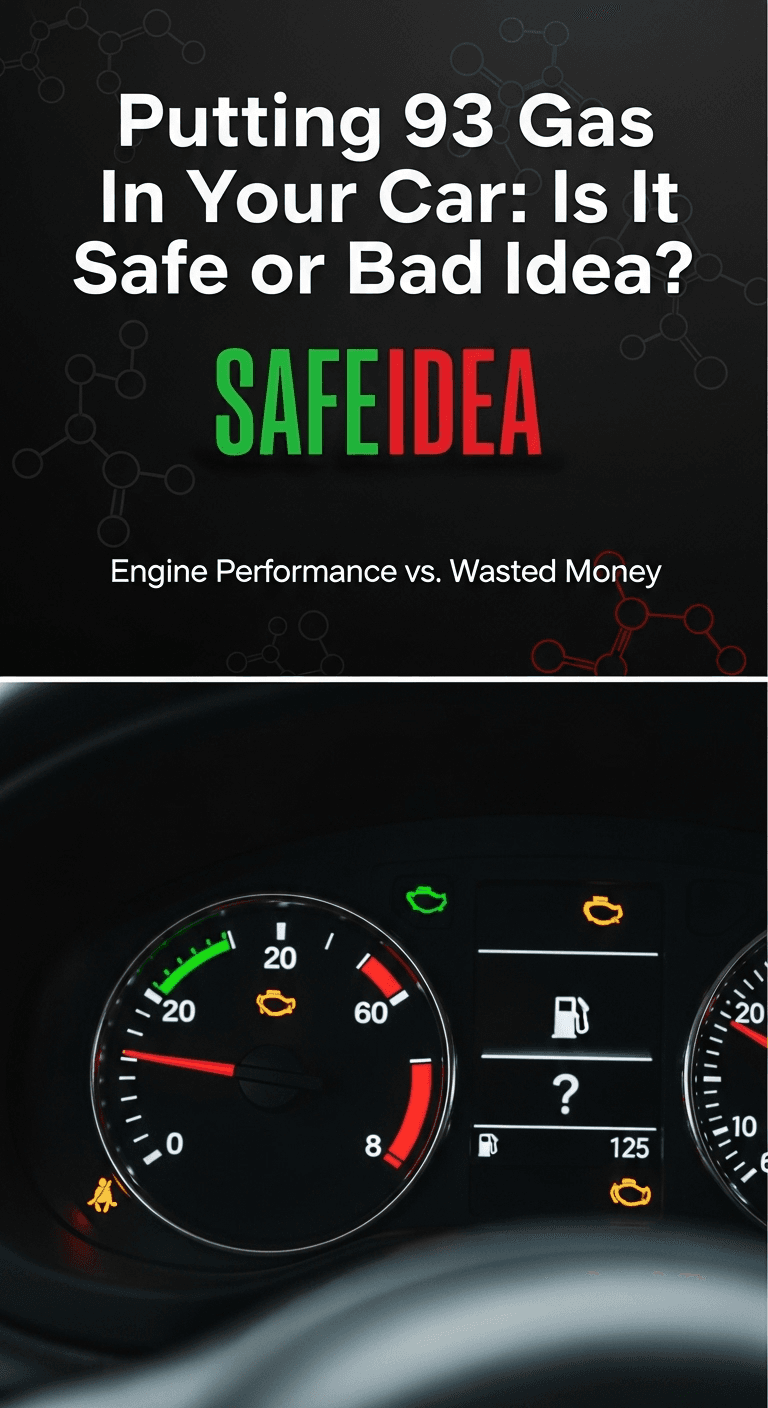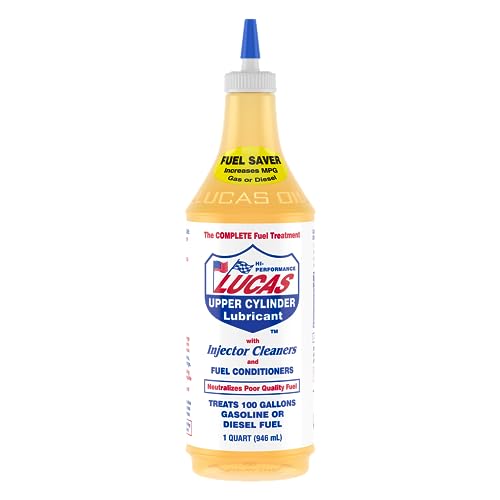Standing at the pump, you face the familiar choice: regular 87 or premium 93? You wonder, can I put 93 gas in my car? Is it a simple upgrade that will boost performance, or just an expensive mistake that could harm your engine? The conflicting advice and marketing claims can make a simple fill-up feel like a high-stakes decision.
Yes, you can put 93 octane gas in your car. If your car’s manufacturer requires or recommends it, you absolutely should. However, if your car is designed for lower octane fuel (like 87), putting 93 octane in it will not harm the engine, but it also offers no benefits and will cost you more money.
This guide cuts through the confusion with a definitive, data-driven look at octane ratings and what they mean for your specific vehicle. Leveraging an extensive analysis of manufacturer guidelines and expert reports, we’ll unpack exactly when using 93 octane is essential and when it’s simply a waste. So, are you wasting money at the pump or protecting your engine? Let’s find out.
Key Facts
- Safety is Scenario-Dependent: Putting 93 octane in a car designed for 87 is safe but provides no benefits. Conversely, using 87 in a car that requires 93 can lead to engine knocking and potential damage.
- Octane is Not Power: An octane rating measures a fuel’s resistance to premature ignition (knocking), not its energy content or cleaning ability. As cited by the EPA, all fuel grades contain detergents.
- The Owner’s Manual is Law: Your vehicle’s owner’s manual is the single most authoritative source for determining the correct fuel, specifying whether premium fuel is “Required” or simply “Recommended.”
- Modern Engines Adapt: Many modern cars with “Premium Recommended” fuel have knock sensors that allow the engine’s computer to adjust ignition timing, safely running on regular 87 octane at the cost of some performance.
- Mixing is Not Harmful: According to reports from sources like Cars.com, mixing 87 and 93 octane gas is safe. It simply creates a mid-grade fuel with an average octane rating of the two.
Putting 93 Octane in Your Car: The Definitive Answer
The short answer to whether you can put 93 gas in your car is yes, it’s generally safe. The more important question is should you? The answer depends entirely on your vehicle manufacturer’s specifications. Using a fuel with a higher octane than required won’t provide extra power or clean your engine better; it will only clean out your wallet faster.

Here’s the simple breakdown of what to do, based on your car’s needs:
- Premium Fuel Required: If your owner’s manual says premium (91 or 93 octane) is “required,” you must use it. Your engine is specifically designed for it.
- Premium Fuel Recommended: If the manual “recommends” premium, you can use it for optimal performance, but using regular 87 octane is perfectly safe and more cost-effective.
- Regular Fuel (87 Octane): If your car is designed for 87 octane, using 93 octane is a complete waste of money. It provides zero benefits.
What is an Octane Rating, Really? (87 vs. 93 Explained)
An octane rating measures a fuel’s ability to resist “engine knock” or “pinging,” which is when fuel ignites prematurely. This uncontrolled combustion happens before the spark plug fires, fighting against the engine’s normal operation, which can reduce power and, over time, cause serious damage. Higher numbers like 93 indicate a higher resistance to this premature ignition, making it essential for high-performance engines.
Think of octane as a fuel’s patience. Higher octane fuel is more ‘patient’ and waits for the spark plug’s signal, which is exactly what high-performance, high-compression, or turbocharged engines need to run smoothly and efficiently. In the U.S., the number you see on the pump is the Anti-Knock Index (AKI), calculated as the average of two other ratings: (R+M)/2.
| Fuel Type | Typical Octane (AKI) | Best For |
|---|---|---|
| Regular | 87 | The vast majority of standard vehicles. |
| Mid-Grade | 88-90 | Cars that recommend, but don’t require, higher octane. |
| Premium | 91-94 | High-performance, turbocharged, or high-compression engines. |
The Ultimate Source: How to Find Your Car’s Official Fuel Requirement
Forget the myths and marketing. The definitive answer for your specific vehicle is hiding in plain sight. Following these simple steps is the most crucial thing you can do to ensure you’re using the right fuel and not wasting money or risking engine damage. Experts at Kelley Blue Book and Car Talk emphasize that checking the manufacturer’s specification is paramount.
- Check the Gas Cap: The quickest and easiest place to look is the sticker on the inside of your fuel filler door. It will almost always state the minimum octane rating required (e.g., “Unleaded Fuel Only, 87 Octane Minimum”).
- Consult the Owner’s Manual: For the most detailed information, open your vehicle’s owner’s manual and look in the index for “fuel,” “gasoline,” or “octane.” This section will give you the complete picture.
- Pay Attention to the Wording: The manual will use very specific terms. You must identify if premium fuel is “Required” or if it is merely “Recommended.” This distinction is critically important.
Pro Tip: Can’t find your physical manual? A quick search for ‘[Your Car Model] 2025 owner’s manual PDF’ usually brings it right up.

Understanding “Premium Required” vs. “Premium Recommended”
The difference between these two small words can save you thousands of dollars in fuel costs or repair bills. It is essential to understand what they mean for your car.
- Premium “Required”: This is a direct command from the manufacturer. It means the engine’s high-compression or forced-induction (turbocharged/supercharged) design demands the higher knock resistance of 91 or 93 octane fuel. Using a lower octane can lead to engine knock, reduced power, poor fuel economy, and could even void your vehicle’s warranty.
- Premium “Recommended”: This is a suggestion, not a mandate. It means the vehicle’s engine control unit (ECU) is sophisticated enough to adjust ignition timing to safely run on lower octane fuel like 87. While you might get a slight, often unnoticeable, performance boost with premium, the car will run perfectly fine and safely on regular gas, making it the more cost-effective choice.
Scenario 1: Using 93 Octane in a Car That Takes 87
So, what happens if you decide to treat your standard sedan, which is perfectly happy with 87 octane, to a tank of 93? The simple answer: not much. Ever wondered if you’re just paying for marketing at the pump? In this case, the answer is likely yes.
Putting 93 octane fuel in a car designed for 87 will not harm your engine, but it provides no performance or efficiency benefits. You are simply spending more money for no tangible gain. Your car’s engine is not designed to take advantage of the higher knock resistance, so the extra “patience” of the premium fuel goes unused.
One of the most persistent myths is that premium gasoline will clean your engine better. This is false. The Environmental Protection Agency (EPA) mandates that all grades of gasoline sold in the United States must contain a minimum level of detergents. These additives are designed to prevent the buildup of harmful deposits in your engine’s fuel system, regardless of whether you choose 87, 89, or 93 octane.
Scenario 2: Using 87 Octane in a Car That Requires 93
This is the scenario you need to avoid. Heard a ‘pinging’ or ‘knocking’ sound from your engine after filling up? This section explains exactly what that is and why it’s a warning sign. Using regular 87 octane fuel in a high-performance engine that explicitly requires 93 octane can lead to several problems.
Fortunately, modern vehicles are equipped with sophisticated knock sensors. These sensors detect the tell-tale vibrations of premature detonation and signal the Engine Control Unit (ECU) to retard the ignition timing. This protects the engine from immediate, catastrophic damage but comes at a cost.
The potential negative consequences include:
- Engine Knocking (Pinging): The primary and most direct result, which can cause long-term damage to pistons and cylinder walls.
- Reduced Performance: The ECU will reduce engine power to protect it, meaning you won’t get the acceleration and horsepower you paid for.
- Lower Fuel Economy: An engine running in this protective, detuned state is less efficient, leading to fewer miles per gallon.
- Potential Long-Term Damage: While one accidental tank is unlikely to cause permanent harm, consistent use of the wrong fuel can lead to costly repairs to the engine and emissions control system.
Using 87 octane in a car that requires 93 can cause engine knocking, reduce performance, and decrease fuel economy. While modern knock sensors can protect the engine by adjusting timing, this is not a long-term solution and you should switch back to premium fuel as soon as possible.
The Mixology of Fuel: What Happens If You Mix 87 and 93 Gas?
It’s a common question: what happens if you add 93 octane to a tank that already has some 87 in it? The good news is, there’s no danger. Mixing 87 and 93 octane gas is not harmful. It simply creates a fuel with an octane rating that is an average of the two.
Quick Fact: The ‘mid-grade’ 89 octane button at many gas stations does exactly this—it blends regular and premium fuel right at the pump!
This can even be a useful strategy. For instance, if your car recommends 91 octane but your local station only offers 87 and 93, you can create your own blend. According to automotive resources like CarParts.com, this practice is perfectly safe.
(0.5 tank * 87 octane) + (0.5 tank * 93 octane) = 1 full tank of ~90 octane
While keeping your engine running optimally is key, ensuring your fuel system remains clean is just as important. For an extra layer of protection against deposits and to maintain peak efficiency, consider using a quality fuel system cleaner.
FAQs About Using 93 Octane Gas
Here are direct answers to some of the most common questions people have when they ask, “can I put 93 gas in my car?”
What happens if I accidentally put 93 gas in my car?
Absolutely nothing bad will happen. Your car will run perfectly fine. The only negative effect is that you spent more money than you needed to on that tank of gas. If your car is designed for 87 octane, it won’t be able to take advantage of the higher rating, but it certainly won’t cause any harm to the engine or other components.

Is it better to run 87 or 93 gas for my car?
It is always better to use the octane level specified in your car’s owner’s manual. This is the definitive guide to what your engine was designed for. Using 93 is only “better” if your car’s manufacturer requires or recommends it for optimal performance. Otherwise, 87 is the better choice for your wallet and provides identical performance in a standard engine.
What should I do if I accidentally put 87 in my car that requires 93?
Don’t panic. One accidental tank is unlikely to cause permanent damage thanks to modern engine technology. Here’s what to do:
* Avoid hard acceleration, heavy towing, or putting a major load on the engine.
* Listen for any “pinging” or “knocking” sounds.
* As soon as you’ve used some of the fuel, top off the tank with 93 octane. This will raise the overall octane level in the tank and help mitigate any issues.
Will using 93 octane gas clean my engine better?
No. This is a common myth. As confirmed by EPA regulations, all gasoline sold in the U.S., regardless of its octane rating, must contain a standardized set of detergent additives. These detergents are what help keep your engine’s fuel injectors and intake valves clean. Premium gas is not formulated to be a better cleaner than regular gas; its only difference is its resistance to knocking.
Final Summary: The Right Fuel for Your Car Matters
Navigating the choices at the gas pump doesn’t have to be complicated. The answer to “can I put 93 gas in my car” is a simple yes, but the real solution lies in understanding what your specific car needs. By ignoring marketing hype and trusting the science behind octane ratings and your manufacturer’s guidelines, you can ensure your vehicle runs as it was designed to—efficiently, powerfully, and reliably.
Ultimately, the choice comes down to a simple principle: use what the engineers who built your car tell you to use.
- Check Your Manual: The owner’s manual and the sticker inside your gas cap are your ultimate guides. They will tell you if premium is “Required” or “Recommended.”
- “Required” is a Command: If your car requires 93 octane, you must use it to prevent engine knock and potential damage.
- “Recommended” is a Choice: If it’s only recommended, using 87 octane is safe and far more cost-effective for daily driving. Using 93 in a car that doesn’t need it is just burning money.
Next time you’re at the pump, check your gas cap and choose with confidence
Last update on 2025-10-20 / Affiliate links / Images from Amazon Product Advertising API













